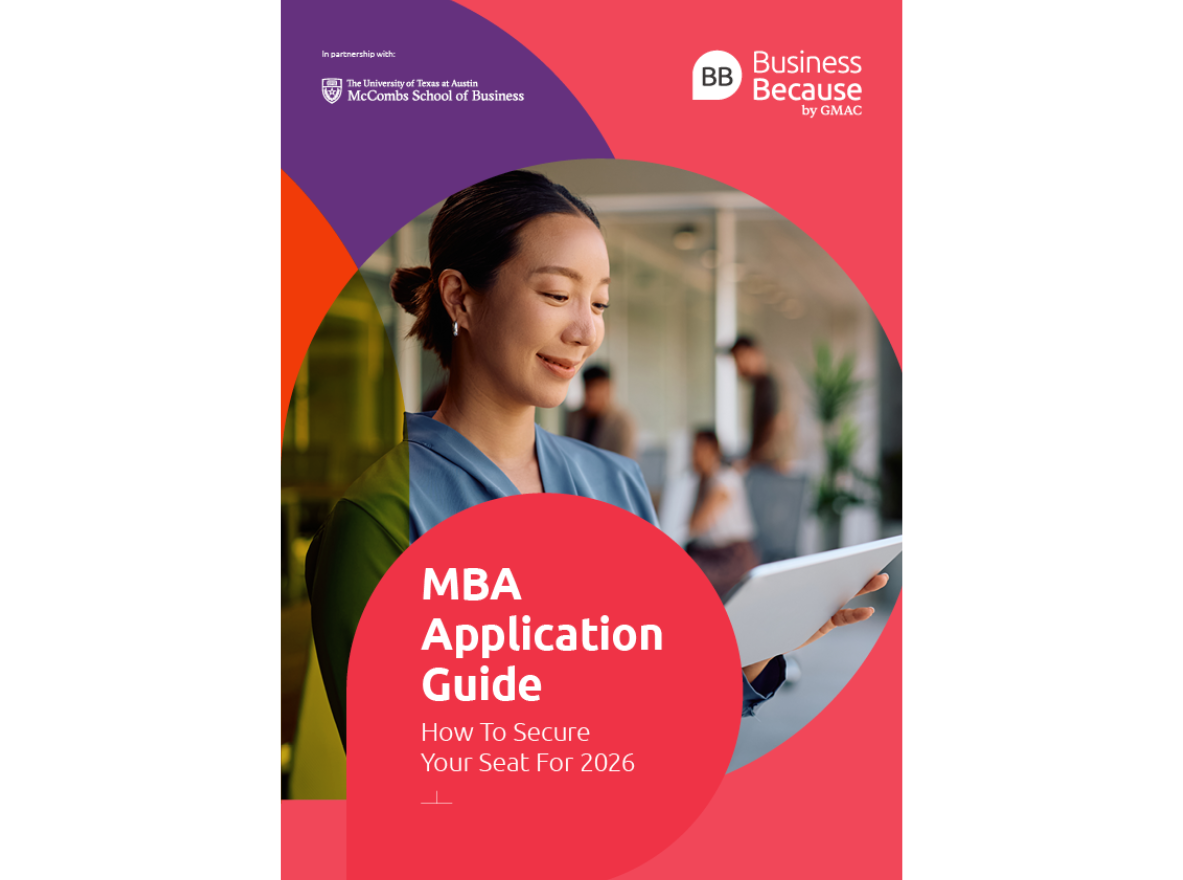There’s no denying that winning a one-way ticket to a top MBA program is likely to be challenging. If you’re going through the application process, it’s a good idea to seek as much advice as you can to improve your chances of getting into the best business schools around.
To give you a head start, we spoke to business school experts, MBA students, and alums to find out how to get into business school in the upcoming admissions cycle.
Applying for a top MBA?
Download our MBA Application Guide
1. Start your MBA application early to get into business school
Not only will starting the application process early keep your stress levels in check, being prepared and proactive when applying to MBA programs can help you lower the costly MBA price tag.
Some business schools offer ‘Early Bird’ discounts or MBA scholarship opportunities for early applicants. For example, WHU Otto Beisheim School of Management offers up to $7k reduction in tuition fees for successful early applicants.
For international applicants, who must also submit visa applications, applying early for your MBA provides enough time to prepare these documents before starting the program.
“We would always advise candidates to have funding in place before making their MBA application, and to take plenty of time to prepare for GMAT/GRE (and IELTS/TOEFL, if they need to take an English language test) so that they are able to achieve scores that are reflective of their ability and potential," says Balbir Guru, head of MBA recruitment and admissions at Bayes Business School.
"We would also advise candidates who will need a student visa to apply by the beginning of May at the latest, and earlier if possible. This is to allow time for our selection process and for the visa be to processed."
Business schools also tend to start filling up their cohort from the first round of applications, so starting the MBA application process early maximizes your chances of gaining a coveted spot.
“Applying in earlier rounds—particularly our first or second deadline—can be advantageous. These rounds typically offer more scholarship opportunities and class spots. However, if you need more time to strengthen your application, it's better to wait for a later round. The key is to balance submitting the strongest possible application with applying as early as you can,” says Rodrigo Malta, assistant dean, MBA marketing, recruiting and admissions at University of Texas at Austin McCombs School of Business.
2. Remember to work hard to ace the GMAT
The GMAT exam can be a vital part of your MBA application. It can provide a chance to showcase your academic ability and offset a low GPA or limited work history.
Start studying early and pay attention to the average GMAT score at your top choice business schools so you remain clear on what score to aim for. Preparing for the GMAT will also help you to feel ready for the rigorous nature of an MBA program.
“We always recommend that applicants start preparing for the GMAT as early as possible, that they use only official GMAT resources in their prep, and that they retake the exam if there is potential to increase their overall score, even by a small margin,” says David White from Menlo Coaching.
3. Reach out to MBA students, alums, and faculty
Connecting with students, alumni, and faculty at your chosen business school before or during the application will show your commitment to the school. It will also help build your MBA network, and help you focus your career goals and what you want to gain from studying an MBA.
“I started by doing research on the culture of the university, the kind of students they were, the prospects of the alumni. I did a couple of interviews with current students to find out the skills and qualities and capabilities to aim for," says Edison Nunez Toro, MBA grad from Imperial College London.
"Give yourself enough time to do your research and talk to our students, alumni, and admissions team," advises Allison Jamison, assistant dean of admissions for full-time programs, Duke University’s Fuqua School of Business. "We enjoy getting to know applicants, and we provide lots of opportunities to interact with us, virtually and in person."
READ: Your 5-Month MBA Application Plan
©voronaman111/Envato
4. Be yourself and show your personality
The MBA application process isn’t just about highlighting your professional qualifications—it’s also important to highlight your personality and what makes you unique. This helps admissions committees understand what you can bring to the MBA classroom.
Make an effort to build your personal brand and show the value you can bring to the school. This means that it’s important to let your authentic voice shines through all aspects of the application—rather than relying on AI tools.
“The first [essay] draft, I put together a few bullet points from my resume and personal experience and fed them into ChatGPT. Spoiler: do not try this at home! The output was stiff, impersonal, and honestly very, very bad. I was missing the most important part, my human experience and human to human communication," says David Garza, MBA grad from U Texas McCombs.
"I went back to the drawing board, closed all distractions, and dove deep into what was moving me to take this big leap forward in my personal story and my career. What were the real motivations? After a few drafts and bouncing some ideas with people close to me that knew me well, it started to take form. Lastly, I went back to check grammar, cadence, and active verbs.
"In general, I would say: Stare at the blank page, struggle with it and come out on the other side proud to have a one pager that’s unique, original, and that reflects your story and aspirations."
Allison Jamison at Duke Fuqua adds: "[Admissions committee] members read a lot of essays, so we are looking to hear and feel a genuine voice, an interesting story, and specific and accurate reasons for their interest in Fuqua."
5. Be clear about your career goals to get into business school
Business schools want to know that you have thought about your future and career path post-MBA. Being clear about your goals will indicate to admissions teams that you’re ambitious and committed to working hard while on the program.
“Take time to reflect on your past experiences and what you’d like to get out of the McCombs MBA experience. When you understand your own strengths, weaknesses, and goals it becomes much easier to answer any interview question you may get,” says Jalen Wade, MBA grad from Texas McCombs.
6. Thoroughly research the business school you're applying to
In your MBA application, it’s essential to show that you have spent time researching the program and target business school. You should make each application tailored to the school by emphasizing key points about the school’s values, program structure, and opportunities throughout.
“Thoroughly research the program so you can clearly articulate why you are interested in McCombs and why you are a good fit. Come prepared with thoughtful questions so you can take advantage of the time that you have [in the interview]," says Avril Dunleavy, another MBA grad from Texas McCombs.
7. Choose the right people for your recommendation letters
The MBA recommendation letter provides admissions committees with an outside perspective of you and your professional ability. It’s important to select people who have worked closely with you such as previous or current employers or even academic professors.
"Student referees should usually be a managers or other senior colleagues who can give us insight on a candidate as a professional and their potential for MBA study," notes Balbir Guru, at Bayes.
The recommender will provide insights into your strengths, weaknesses, and skills that align with what the MBA program expects of you. Selecting the people who know you and your professional strengths best will ensure you receive a great recommendation letter.
“Admissions committees rely heavily on the perspectives of your recommenders and in many cases, it can be the deciding factor in your application,” says Megan Stiphany, admissions consultant at Stacy Blackman Consulting.
"Recommenders can also give insight into personality, what it’s like to regularly work with the applicant, and personal details, such as sense of humor, empathy, listening skills, and team skills, that may be hard for the applicant to convey themselves," adds Allison Jamison at Duke's Fuqua.
8. To get into business school, remember to ask questions during the MBA interview
The MBA interview is a chance for business schools to get to know you better and hear more about why you’re a good fit for the MBA program. Asking carefully thought-out questions will emphasize your interest in the program and show admissions teams that you’re clued up on intricate aspects of the program and keen to learn even more.
“To prepare for the interview, I first looked up my interviewer on LinkedIn to find out more about him. What does he do? What is he interested in? After that, I prepared my story on how I am the perfect candidate for this MBA. I tried to match everything to what I said in my essay so I could create a good verbal picture,” says Edison Nunez Toro.
“The most successful interviews feel like a two-way conversation, where the candidate is engaged, authentic, and has taken the time to reflect on how the MBA fits into their next stage of professional growth," says Balbir Guru at Bayes.
Researching the business school and seeking out advice is an important part of your MBA application journey.
For more insider tips on how to ace the MBA application process, download our MBA Application Guide | How To Secure Your Seat For 2026





